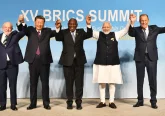Last week, Professor Rehman Sobhan, Chairman of the Center for Policy Dialogue in Dhaka, Bangladesh, visited the UN Development Programme in New York City to discuss his most recent book. I had the opportunity to speak with Professor Sobhan about the motivation behind his work and learn about the years of field research that preceded it.

Challenging the Injustice of Poverty: Operationalizing an Agenda for Inclusive Development Across Southeast Asia is a culmination of Professor Sobhan’s efforts to understand the roots of economic exclusion across 5 countries over the past 4 years. At its core is Sobhan’s uncompromising insistence on identifying the source, as opposed to merely addressing the symptoms of poverty. According to Sobhan, poverty is not a social inevitability, but rather a consequence of an unjust economic system within which it is reproduced. As is the case in Bangladesh (and many developing countries), the poor are victims of structural injustice, with unequal access to assets and marginalized opportunities for human development; such is the fallacy of neoliberalism as opportunity: entry into the marketplace bears no promise of mobility when the terms of engagement are restricted to participation at the bottom-most level.
Critical of the prevailing “pro-poor” rhetoric, Sobhan outlines several strategies to uproot the causes of economic disadvantage. The first issue he tackles is market injustice, pushing for the formation of policies that would allow the poor to share in the Value Addition Process. “One of the most basic, yet most insidious dynamics of poverty,” Sobhan says, is that “the poor only ever participate in the lowest tier of the market.” A fairer system would encourage private sector corporations (mainly agro-processing groups in the Southeast Asian context) to provide primary producers with an equity stake in the company. Similarly, he suggests commercial ventures ran by NGOs be restructured into microenterprises jointly owned by their supply chain.
Sobhan is emphatic about another connection between theory and praxis: one of the main elements of severe and chronic poverty is social isolation, underscoring the importance of collective action in the struggle against economic exclusion. He incorporates this notion into many of his programme recommendations, such as the establishment of citizens’ task forces in Bangladesh, India, Sri Lanka, Nepal and Pakistan to hold local governments accountable for agrarian reform. Accountability is fundamental to upholding the lofty promises of pro-poor agendas, Sobhan argues, which is why he also calls for the formation of civil society task forces for monitoring the outcome of budgetary expenditures for poverty alleviation.
Not surprisingly, Sobhan is a personal friend of Muhammad Yunus and advisor to Grameen Bank. After decades of working with Grameen and witnessing its expansion, he is well aware of the transformative power of the institution but would like to see the integration of the micro and macro financial sectors. “Microfinance is ghettoized,” remarks Sobhan. “Because it deals with the poor on a unique level, apart from the mainstream financial community, there are no national policies on microfinance, and little direct government support.” Yet, almost 20% of all financial flows in Bangladesh are transactions among microlenders.
Poverty remains widespread across Southeast Asia, with historical and actual attempts to address the problem yielding mixed results. What is promising about Professor Sobhan’s work is that each of his proposals hinge on the concept of ownership of the development process by the poor, who are stakeholders in the drive towards transformational change.
Challenging the Injustice of Poverty: Operationalizing an Agenda for Inclusive Development Across Southeast Asia was published by Sage in 2010.
Watch Professor Sobhan speak about his book at UNDP








No Comment